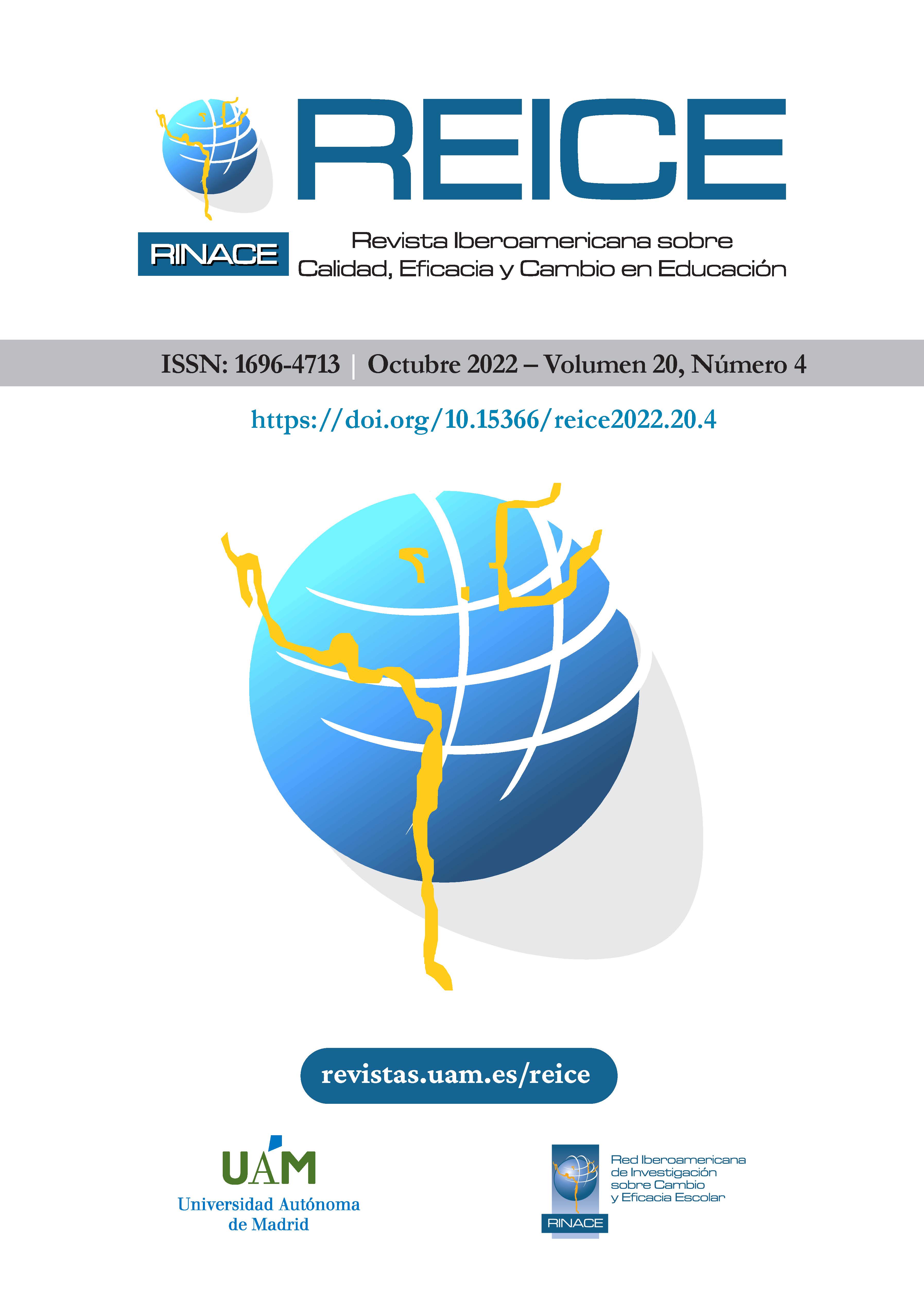Description of Educational Models of Chilean Universities: Configuration of their Foundational Dimensions
Keywords:
Educational models, Higher education, Educational policies, Curriculum, Chile
This work is licensed under a Creative Commons Attribution-NonCommercial-NoDerivatives 4.0 International License.
Abstract
The social demand for restructuring the formation of professionals for the knowledge society promotes the updating of the Educational Models (EM) of Higher Education Institutions (HEI), whose diversity prevents obtaining a panoramic view of the trends in Chile. In Chile, state universities have experienced public policies such as the one in the 1980s that have promoted liberal practices in Higher Education and reduced the State's commitment to them. This study characterizes the EM of traditional Chilean universities, identifying their foundational dimensions and their configuration. A content analysis with a descriptive and inferential level of depth, it is carried out by reviewing the models of a sample of 15 traditional universities with national representativeness. Among the results is determination of five dimensions as a map of key factors for the understanding of how learning takes place, how the curriculum is managed and what resources are prioritized by HEIs. At an inferential level, the homogeneity generated between public and private universities is observed, in addition to the emphasis on implementing accountability mechanisms to the detriment of their territorial linkage.
Downloads
References
Alarcón, L., Torres, A. y Carrera, M. (2019). Modelo pedagógico por competencias en el contexto de la educación superior ecuatoriana del siglo XXI. Revista Varela, 19(52), 18-32.
Ardila, M. (2010). Modelo pedagógico para b-learning. Revista Educación y Desarrollo Social, 4(1), 38-55.
Bernasconi, A. y Rojas, F. (2004). Informe sobre la educación superior en Chile: 1980-2003. Editorial Universitaria.
Buckner, E. (2017). The worldwide growth of private higher education: Cross-national patterns of higher education institution founding’s by sector. Sociology of Education, 90(4), 296-314. https://doi.org/10.1177/0038040717739613
Cancino, V. y Schmal, R. (2014). Sistema de acreditación universitaria en Chile ¿Cuánto hemos avanzado? Revista Estudios Pedagógicos, 40(1), 41-60. https://doi.org/10.4067/S0718-07052014000100003
Cardoso, A. (2007). Del proyecto educativo al modelo pedagógico. Odiseo, Revista de Pedagogía, 4(8), 1-42.
Cartuche, N., Tusa, M., Agu?insaca, J., Merino, W. y Tene, W. (2015). El modelo pedagógico en la práctica docente de las universidades públicas del país. En M. Ortiz, C. Crespo, E. Isch y E. Fabara (Coords.), Reflexiones sobre la formación y el trabajo docente en Ecuador y América Latina (pp. 145-173). Universidad Politécnica Salesiana.
Carvajal, A. (2002). Teorías y modelos: Formas de representación de la realidad. Comunicación, 12(1), 1-14.
Cerón Aguilar, S. (1998) Un modelo educativo para México. Editorial Santillana.
Del Castillo, R. y Olano, D. (2020). Gestión estratégica, políticas y calidad educativa en el contexto universitario. Revista de Investigación en Ciencias Económicas, 8(15), 26-38. https://doi.org/10.5377/reice.v8i15.9940
Dudin, M. N., Bezbakh, V. V., Frolova, E. E. y Galkina, M. V. (2018). The models of higher education in Russia and European countries at the beginning of the XXIst ?entury. European Journal of Contemporary Education, 7(4), 53-71. https://doi.org/10.13187/ejced.2018.4.653
Durán Téllez, A. S. (2018). Perspectiva pedagógica y filosófica de uniclaretiana desde el concepto de justicia educativa. Ratio Juris, 13(26), 231-254. https://doi.org/10.24142/raju.v13n26a11
Estupiñan, N. (2012). Análisis de los modelos pedagógicos implementados en tres instituciones educativas del sector oficial de la ciudad de Santiago de Cali [Trabajo fin de Grado]. Universidad Nacional de Colombia.
Favero, A. A., Consalter, E. y Tonieto, C. (2020). The market logic and its implications at the policies and processes of evaluation of the higher education. Educar em Revista, 36, 1-20. https://doi.org/10.1590/0104-4060.74384
Flórez, R. (2005). Pedagogía del conocimiento. McGraw-Hill.
Giannakakis, V. (2020). Neoliberalism and culture in higher education. On the loss of the humanistic character of the university and the possibility of its reconstitution. Studies in Philosophy and Education, 39(4), 365-382. https://doi.org/10.1007/s11217-019-09682-z
León, M., Ortega, C. y Estrada, V. (2016) Fundamentos del modelo educativo para la enseñanza online de la universidad de especialidades espíritu santo, Ecuador. Revista Científica ECOCIENCIAS, 3(5), 1-11.
Levina, E. Y., Larionova, I. A., Lashkova, L. L., Fabrikov, M. S., Lushchik, IV, Kudryashov, V. V., Abramov, S. G. y Maystrenko, AG (2018). Worldwide models of higher education management: Country and cross-cultural factors analysis. Modern Journal of Language Teaching, 8(6), 211-223.
Luu, G. y Metcalfe, A. S. (2020). Visualizing quality: University online identities as organizational performativity in higher education. The Review of Higher Education, 43(3), 781-809. https://doi.org/10.1353/rhe.2020.0007
Mantilla-Falcón, L. M., Miranda Ramos, D. P., Ortega Zurita, G. E. y Meléndez-Tamayo, C. F. (2020). Hibridación de modelos pedagógicos en la práctica docente en la educación superior en Ecuador. Caso universidad técnica de Ambato. Cuadernos de Investigación Educativa, 11(1), 85-101. https://doi.org/10.18861/cied.2020.11.1.2944
Marginson, S. (2011). Higher education in East Asia and Singapore: Rise of the Confucian model. Higher Education, 61(5), 587-611. https://doi.org/10.1007/s10734-010-9384-9
Organización de las Naciones Unidas para la Educación, la Ciencia y la Cultura. (1998). Declaración mundial sobre la educación superior para el siglo XXI: Visión y acción. UNESCO.
Polaino, C. J., Romillo, A. J. y Muñoz, J. F. (2020). Modelo educativo-pedagógico integrado de la Universidad de Otavalo, Ecuador. Formación Universitaria, 13(5), 115-128. https://doi.org/10.4067/S0718-50062020000500115
Rodríguez, J. y Artiles, J. (2017). Aprendizajes y buenas prácticas para la gestión de la institución superior. REICE. Revista Iberoamericana sobre Calidad, Eficacia y Cambio en Educación, 15(1), 129-141.
Tünnermann, B. (2008). Modelos educativos y académicos. Editorial Hispamer.
Vetchinova, M. (2018) University as a center of exemplary knowledge. Educational Studies, Higher School of Economics, 2(1), 295-302. https://doi.org/10.17323/1814-9545-2018-2-295-302
Villanueva-Vásquez, A. V. (2020). Modelo exploratorio de calidad en educación superior. Dimension Empresarial, 18(1), 1-19. https://doi.org/10.15665/dem.v18i(1).2239
Zhu, G. (2020). A prism of the educational utopia: The East Asian educational model, reference society, and reciprocal learning Comparing high-performing education systems: Understanding Singapore, Shanghai, and Hong Kong. Discourse-Studies in the Cultural Politics of Education, 42, 943-957. https://doi.org/10.1080/01596306.2020.1714547

